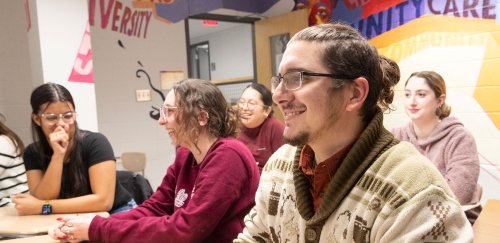Bachelor of Social Work B.S.W.

Values that Frame Our Program
The BSW program seeks to educate future social workers to become critical and creative citizens. We frame issues in social work and the larger culture in a manner that places:
- social
- racial
- gender
- economic
- and climate justice
as primary lenses through which we approach our world and our work.
Graduates Prepared to Transform Systems
Our graduates will enter the profession as generalist practice social workers prepared to engage in work in any system with an anti-oppressive framework that emphasizes human rights and expanding opportunities to individuals through the transformation of unjust systems.
Hands-On, Experiential Learning Prioritized
The social work major leverages experiential learning as a key component. All students complete two semesters of an internship in a social service agency. They complete their field work in the fall and spring semester of their senior year (16 hours per week for 14 weeks). Students may choose to complete some of their internship hours in the summer.
Interested in Social Work?
Take the next step and apply to Rhode Island College using the Common Application.
Our Faculty

Dr. Mary J. Archibald
- Assistant Professor
Dr. Wendy L. Becker
- Associate Professor

Dr. Jesse Capece
- Associate Professor

Dr. Joshua D. Diem
- Associate Professor
Dr. Cary Donaldson
- Assistant Professor
Program Details
Admission Requirements
Admission to the major is required in the junior year. To be admitted, students must:
- Enroll in Social Work 326, completing all course prerequisites.
- Apply to the program and include a personal statement and letter(s) of reference during the first semester of the junior year, before enrolling in Social Work 327. If applying to the accelerated B.S.W. to M.S.W. program, a second letter of reference from a B.S.W. faculty member is required.
- Have a minimum grade point average (GPA) of 2.00 at the college level and a minimum GPA of 2.67 in 300-level social work courses. Maintenance of a GPA of 3.0 is the minimal standard for the B.S.W. to M.S.W.
- Show evidence of personal qualities considered essential to professional social work practice, such as responsiveness and sensitivity in relationships, values compatible with the values of the social work profession, the ability to understand and carry out the ethical obligations of a social worker, commitment to improving social conditions and the ability to function collectively with others. If applying to the accelerated B.S.W. to M.S.W. program, students must demonstrate the ability to do graduate-level work.
Transfer students must also comply with these requirements. Specific information about application procedures may be obtained from assigned faculty advisors, the chair of the B.S.W. department or their designee.
Retention Requirements
Students must maintain a minimum grade point average (GPA) of 2.00 at the college level and a minimum GPA of 2.67 in all 300-level social work courses. No student will be allowed to enter a senior year field placement (Social Work 436) if their GPA falls below these standards.
Please Note: Students who receive an F in any required social work course or a C- or less in any two required social work courses will be dismissed from the major. A copy of the Bachelor of Social Work Academic Standing Policy, including appeal procedures, is distributed to students in the department.
Course Information
Here we provide a course overview, course descriptions, plan of study and an Academic Rhode Map for each program, a semester-by-semester plan to help you toward graduation in four years:
Program/Learning Goals
Upon completion of this program, students will be able to:
- engage in entry-level social work practice that is informed by the best available evidence
- use policy practice skills to create and influence change
- apply social work values and ethics to guide their professional practice
- understand the effects of culture, oppression and human diversity in a multicultural society
- apply knowledge of human behavior and the social environment to work with individuals, groups, families, organizations and communities
- work to achieve human rights and social and economic justice
Writing in the Discipline
Why or in what ways is writing important to your discipline/field/profession?
Writing is an essential skill for social workers. Professional competency depends on one’s ability to effectively communicate to and/or about clients and their needs, communities and their needs, policy priorities that are currently not being met and/or need to be met in different ways, and the ability to promote and advocate for justice.
Which courses are designated as satisfying the Writing in the Discipline (WID) requirement by your department? Why these courses?
The English Department has three concentrations, each of which has designated its own WID courses:
SWRK 302: Social Work Research Methods 1 In this course students learn how to conduct and write a literature review, an essential skill for producing and/or understanding research.
SWRK 326: Generalist Social Work Practice In this course students learn how to conduct social assessments and produce the accompanying write-up. Additionally, students learn how to take professional notes for client files and work on other forms of professional writing such as referrals and client summaries.
What forms or genres of writing will students learn and practice in your department’s WID courses? Why these genres?
The range of genres or forms of writing in which students engage and practice in the English major is too extensive to list in its entirety and depends, to a significant extent, on students’ chosen concentrations within the major. Having said this, we offer a few examples of the writing students do in different concentrations below.
Students practice and hone their writing skills through reflective writing, journal writing, note taking, and academic writing. These genres represent the wide range of writing styles that students will be asked to conduct in professional work settings, as well as giving students the opportunity to critically reflect on their thoughts and emotions related to their work and the field.
What kinds of teaching practices will students encounter in your department’s WID courses?
Students will participate in courses with teaching practices that include low stakes and high stakes writing assignments, peer feedback, scaffolded assignments, and opportunities for revision incorporating peer and/or instructor feedback for subsequent drafts.
When they’ve satisfied your department’s WID requirement, what should students know and be able to do with writing?
Upon completion of the Social Work program, Bachelor of Social Work (BSW) graduates should be able to do the following:
- accurately document professional practice in various practice settings
- produce thorough and critical research documents
- create and disseminate written and oral presentations to clients, co-workers, and policy makers
- engage in critically self-reflective writing for the purpose of professional development
Honors Program
To be eligible for the BSW Program Departmental Honors program, a student:
- must secure a faculty advisor from the program and inform the departmental chair of this agreed relationship
- must major in social work
- must have completed a least four 300-level courses in the major
- must have earned an overall GPA of 3.0 and a GPA of 3.25 in the major
Please Note: Transfer students without established GPAs at Rhode Island College may be considered for honors eligibility on the basis of their transcripts from previous institution(s).
How to Pursue the Honors Program
Eligible students must submit a two-to-three-page proposal-topic agreed upon between the student and advisor. The proposal should identify the topic of interest; current literature on the topic; methods; any theories that might be relevant; and a timeline of completion.
Important Deadlines
The proposal for the fall semester of the senior year is due April 15 of the previous academic year. A proposal for the spring semester of the senior year is due November 1. The dates coincide with the deadline for independent or directed study.
B.S.W. Resources and Forms
Resources for Students
Forms for Faculty and Instructors

BSW Program Chair

